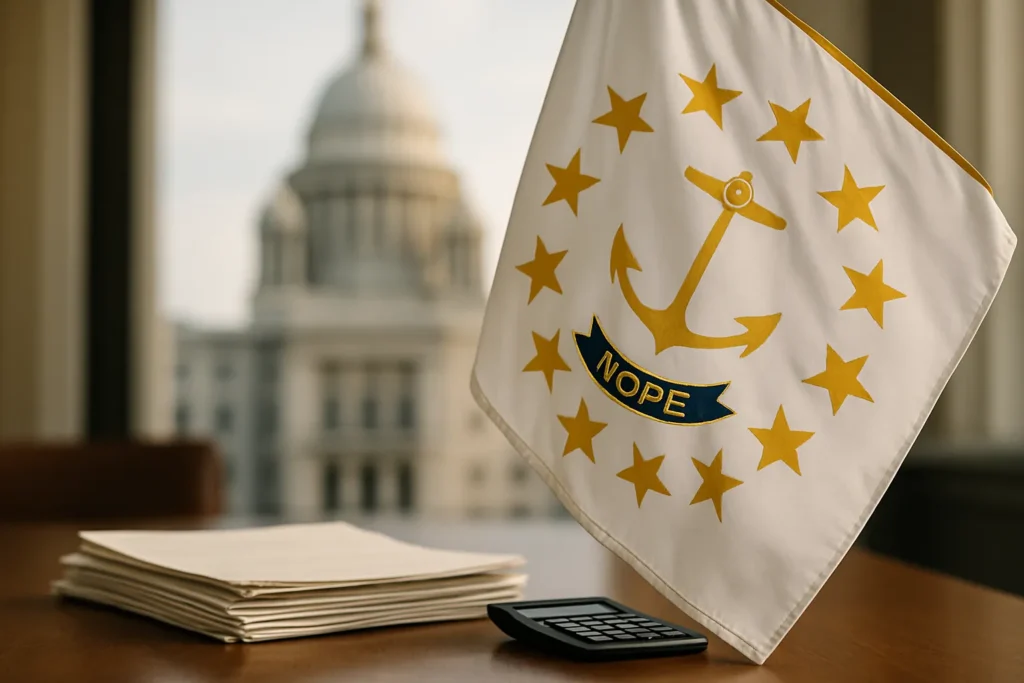The Budget Nobody Wanted—and Everyone Got
On a humid June afternoon at Rhode Island’s State House, Governor Dan McKee addressed an anxious press corps with an admission that speaks volumes about the state of budget politics in America: though sharply critical of the General Assembly’s $14.3 billion spending plan, he would allow the FY26 budget to become law without his signature. For the first time since the Carcieri administration’s budget standoff in 2010, the Ocean State will see its annual spending plan adopted absent the governor’s explicit endorsement. It’s a dramatic gesture—tainted by frustration, strategic calculation, and more than a little resignation.
Why such visible reluctance at a moment usually marked by ceremonial bill signings and bipartisan pats on the back? Look no further than the extensive array of new taxes and fees bundled into this year’s plan—changes Governor McKee himself called “unnecessary.” The General Assembly imposed a 2-cent-per-gallon gas tax hike; a 63% increase in real estate conveyance taxes; monthly fees on health insurers (adding $4 per insured Rhode Islander); plus a so-called “Taylor Swift tax” slapping million-dollar second homes. These hikes touch everyone, from working-class commuters to prospective home buyers, yet were never part of McKee’s original blueprint. The budget became, in the governor’s own words, “a bad budget.”
Legislative leadership, on the other hand, stood steadfast. Speaker K. Joseph Shekarchi and Senate President Valarie Lawson declared the plan balanced and responsive to real needs, citing expanded health care access, affordable housing investments, and fiscal stability. Critics, however, hear those reassurances and see political cover for squeezing an already burdened middle class.
Behind Closed Doors: The Politics of Process
Dig beneath the headlines and you find the story of not just a policy disagreement, but a system showing its cracks. How did Rhode Island’s budget process slip into a standoff that left the state’s top Democrat refusing a rubber stamp?
Governor McKee revealed that his administration wasn’t privy to major budget amendments—or the long list of new fees—until June 10, just days before the final committee vote. This lack of transparency is more than an inside baseball squabble. Civic engagement is hobbled when public officials operate in silos, and the resulting ungrounded compromises can spark precisely the backlash now surfacing.
Harvard political scientist Jennifer Hochschild points to such budget standoffs as symptoms of deeper democratic malaise. “When legislative leaders make consequential decisions behind closed doors and spring them on the public and executive, trust in government erodes. People lose faith that their tax dollars are spent wisely or fairly.”
Even some lawmakers were caught flat-footed; Speaker Shekarchi and President Lawson only learned of McKee’s decision through a letter sent out as the governor faced reporters. Such a communication breakdown reveals tensions even inside the dominant Democratic machine—tensions that can leave citizens asking, whose interests are really at the table?
“We gave them a good budget, as we have every year, and they gave us a bad budget.” — Governor Dan McKee
It’s easy to caricature this moment as a petty squabble among political elites. But for Rhode Islanders dealing with rising costs, the impact is far from abstract. The very process failures that led to this budget drama suggest that the mechanisms for representing ordinary people—transparency, debate, compromise—are faltering when they are needed most.
Liberal Values, Conservative Challenges
Progressives rightly worry about what these new taxes mean for struggling families, and frankly, how the drama unfolded. Yes, funding gaps—like the deficit at the Rhode Island Public Transit Agency—demand action. But is kneejerk taxation the answer, or a reflection of policymakers falling short of real innovation? Rising affordability concerns ripple outward: how do you square a mostly regressive tax hike with the economic fragility of the typical Rhode Islander?
The approach adopted by the Assembly reflects a subtle, but unmistakable, embrace of fiscal conservatism: make underfunded programs harder to access, while plugging budget holes on the backs of commuters and homebuyers. Instead of advancing bold, sustainable revenue policies—think closing corporate loopholes or restructuring state incentives—lawmakers defaulted to the quickest, least painful solution for the well-connected.
Nationally, such budget disputes echo a historic tension: who bears the cost when government services fall short or costs climb? According to a recent Pew Research Center survey, overwhelming majorities of Americans say their state governments should do more for working-class families, not less. Yet, so often, the burden falls not on the wealthiest or major corporations, but everyday folks just trying to pay the bills.
Beyond that, the process controversy exposes problems with the very structure of Rhode Island government. Without line-item veto authority, McKee says he can only accept or reject the budget as a whole. Even if he had vetoed it, veto-proof supermajorities mean the Assembly would still have prevailed—an accountability gap that shields lawmakers from tough public debate over spending priorities. The result? A system where progressive reforms are boxed out by the inertia of the status quo and political calculations.
Looking ahead, the state needs a reimagined budgeting process—one that invites public scrutiny, places fairness above expediency, and empowers both governors and citizen advocates to check unwise tax hikes. Economic resilience, environmental protection, and true social justice demand it. For now, though, Rhode Islanders are left with a budget, a political statement, and gnawing questions about who really holds the power at the State House.

